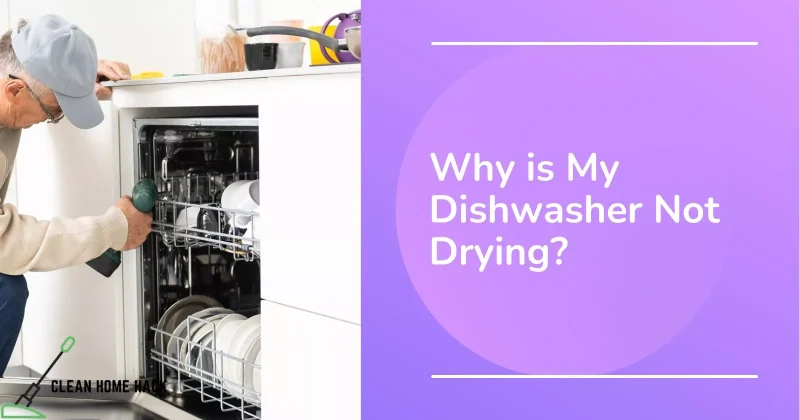Why is My Dishwasher Not Drying? (5 Common Reasons)

 The Short Answer is: The Short Answer is: |
| There are several reasons why a dishwasher may not be drying dishes properly. One possible cause is improper dish placement on the racks, which can prevent dishes from drying properly. Another possible cause is malfunctioning dishwasher parts, such as a broken heating element or a malfunctioning fan, which can prevent dishes from drying properly. |
If you’ve ever opened your dishwasher to find wet dishes, you know how frustrating it can be. There are several reasons why a dishwasher may not be drying dishes properly, including mechanical failures, inefficient loading and placement procedures, and faulty heating elements.
In this article, we’ll explore the topic, “Why is My Dishwasher Not Drying”. Whether you’re dealing with a clogged dishwasher or a broken component, we’ll help you get to the bottom of the issue so that your dishes come out clean and dry every time.
Table of Contents
Understanding the Drying Cycle
The drying cycle is an essential part of the dishwasher cycle that ensures dishes are completely dry by the end of the washing cycle. There are two types of drying cycles: air-dry and heat-dry. During the air-dry cycle, the dishwasher uses a fan to circulate air around the dishes to dry them.
On the other hand, during the heat-dry cycle, the dishwasher heats up to a high temperature to evaporate any remaining water on the dishes. Some dishwashers have a combination of both air-dry and heat-dry cycles.
The drying cycle can be affected by several factors, including malfunctioning dishwasher parts, wrong cycle selection, and clogged dishwashers.
It’s important to understand the drying cycle and the potential issues that can arise to troubleshoot and fix the problem to ensure that your dishes come out clean and dry every time.
Common Reasons for Dishwashers Not Drying
Dishwashers are a convenient appliance that saves time and effort in the kitchen. However, one common issue that many people face is that their dishwasher does not dry dishes properly.
There are several reasons why this may happen, and this article will explore some of the most common ones.
1. Poor Dish Placement
One of the most common reasons why dishes may not dry properly is due to poor dish placement. If dishes are not placed correctly on the racks, water may pool on them, preventing them from drying.
To ensure that dishes dry properly, make sure that they are placed at an angle so that water can run off them easily. Additionally, avoid overcrowding the dishwasher, as this can also prevent dishes from drying properly.
2. Incorrect Cycle Settings
Another reason why dishes may not dry properly is due to incorrect cycle settings. Some dishwashers have different drying options, such as heated drying or air drying.
If the wrong setting is selected, dishes may not dry properly. Make sure to check the dishwasher’s manual to ensure that the correct drying setting is selected.
3. Low Rinse-Aid Levels
Rinse aid is a liquid that is added to the dishwasher to help dishes dry properly. If the rinse aid level is low, dishes may not dry properly. Make sure to check the rinse aid dispenser and refill it if necessary.
Additionally, make sure that the rinse aid dispenser is not clogged, as this can also prevent dishes from drying properly.
4. Blocked Vent
If the dishwasher’s vent is blocked, it can prevent dishes from drying properly. The vent is located at the bottom of the dishwasher’s door and allows hot, moist air to escape.
If the vent is blocked, the hot, moist air will remain inside the dishwasher, preventing dishes from drying properly. Make sure to check the vent and remove any blockages.
5. Faulty Heating Element
The heating element is responsible for heating the air inside the dishwasher to help dry dishes. If the heating element is faulty, dishes may not dry properly.
To check if the heating element is working properly, run the dishwasher on the hottest cycle and check if the dishes are dry at the end of the cycle. If they are not, the heating element may need to be replaced.
In conclusion, there are several reasons why a dishwasher may not dry dishes properly. By following the tips outlined in this article, you can ensure that your dishwasher is working properly and that your dishes are dry and ready to use.
Checking and Cleaning the Dishwasher
If your dishwasher is not drying dishes properly, it may be due to a clogged dishwasher. To check and clean the dishwasher, follow these steps:
- Remove any debris: Remove any debris from the dishwasher, including food particles and other debris that may be clogging the dishwasher.
- Clean the dishwasher filter: The dishwasher filter can become clogged with debris over time, preventing water from draining properly. Clean the filter to ensure that water is draining properly.
- Check the dishwasher spray arm: The dishwasher spray arm can become clogged with debris, preventing water from reaching all areas of the dishwasher. Clean the spray arm to ensure that water is reaching all areas of the dishwasher.
- Run the dishwasher with vinegar: Running the dishwasher with vinegar can help remove any buildup or debris that may be clogging the dishwasher. Simply add a cup of vinegar to the bottom of the dishwasher and run a cycle.
By checking and cleaning the dishwasher, you can ensure that water is draining properly and that dishes are drying properly.
Adjusting Dishwasher Settings for Better Drying
If your dishwasher is not drying dishes properly, adjusting the dishwasher settings can help. Here are some tips for adjusting dishwasher settings for better drying:
- Select the right cycle: Make sure the correct cycle is selected, and that the “Heated Dry” option is selected if available.
- Use rinse aid: Rinse aid helps the dishes to shed water and dry quickly.
- Load dishes properly: Proper dish placement can help to ensure that dishes dry properly. Make sure dishes are properly placed on the racks.
- Avoid overcrowding: Overcrowding the dishwasher can prevent water from reaching all areas of the dishwasher, leading to wet dishes. Avoid overcrowding the dishwasher to ensure that water is reaching all areas of the dishwasher.
By adjusting the dishwasher settings, you can ensure that dishes are drying properly and coming out clean every time.
Using Rinse Aid and Proper Detergent
Using the right detergent and rinse aid can help improve the drying performance of your dishwasher. Rinse aid helps to reduce water spots and improve drying performance by helping the water to sheet off the dishes.
Make sure to use the appropriate amount of detergent and rinse aid, and that they are not old or expired. Additionally, using too much detergent can lead to excess suds, which can prevent dishes from drying properly.
By using the right detergent and rinse aid, you can help ensure that your dishes come out clean and dry every time.
Maintaining the Dishwasher’s Heating Element
The heating element is an essential part of the dishwasher’s drying cycle. If the heating element is not working properly, dishes may not dry properly. To maintain the heating element, follow these steps:
- Clean the heating element: Over time, the heating element can become covered in mineral deposits, which can prevent it from working properly. Clean the heating element to ensure that it is working properly.
- Check for damage: Check the heating element for any signs of damage, such as cracks or breaks. If the heating element is damaged, it will need to be replaced.
- Run hot water: Run hot water in the sink before starting the dishwasher to ensure that the water entering the dishwasher is hot. This can help improve the performance of the heating element.
By maintaining the heating element, you can help ensure that your dishes come out clean and dry every time.
Troubleshooting Persistent Drying Problems
If you’ve tried all of the above tips and your dishwasher is still not drying dishes properly, there may be a more persistent problem. Here are some additional troubleshooting tips:
- Check the water temperature: Make sure that the water entering the dishwasher is hot enough. The ideal temperature is between 120 and 140 degrees Fahrenheit.
- Check the dishwasher’s thermostat: The dishwasher’s thermostat regulates the temperature of the water during the wash and rinse cycles. If the thermostat is not working properly, the water may not be hot enough to properly dry the dishes.
- Check the dishwasher’s timer: The dishwasher’s timer controls the length of the wash and rinse cycles. If the timer is not working properly, the dishwasher may not be running long enough to properly dry the dishes.
- Call a professional: If you’ve tried all of the above tips and your dishwasher is still not drying dishes properly, it may be time to call a professional. A professional can diagnose and fix the problem to ensure that your dishes come out clean and dry every time.
By troubleshooting persistent drying problems, you can ensure that your dishwasher is working properly and that your dishes come out clean and dry every time.
Frequently Asked Questions Related to the Topic:
Why is my dishwasher still wet inside?
There are several reasons why a dishwasher may still be wet inside after a cycle. Improper dish placement on the racks or malfunctioning dishwasher parts can prevent dishes from drying properly.
Using rinse aids can help improve drying performance, reduce water spots, and help prevent filming as it allows the water to “sheet” off your dishes rather than cling to them. If the fan is not functioning correctly or has become clogged with debris, it may not distribute the heat evenly, resulting in inadequate drying.
Overloading the dishwasher with too many dirty dishes can limit airflow, leaving items wet. If these tips don’t work, it’s possible that a broken component is responsible, and a professional should be called to diagnose and fix the problem.
How do you fix a dishwasher that is not drying?
If your dishwasher is not drying dishes properly, there are several things you can do to fix the problem. First, make sure that dishes are properly placed on the racks and that the dishwasher is not overloaded.
Use a rinse aid to help improve drying performance and prevent spotting. Check the heating element and fan for any signs of damage or debris, and clean them if necessary.
If these tips don’t work, it’s possible that a broken component is responsible, and a professional should be called to diagnose and fix the problem.
Conclusion on Why is My Dishwasher Not Drying
In conclusion, a dishwasher not drying dishes properly can be a frustrating problem to deal with. However, there are several reasons why this may be happening, including improper dish placement, malfunctioning dishwasher parts, wrong cycle selection, and a clogged dishwasher.
By following the tips outlined in this article, such as proper dish placement, checking for broken parts, selecting the right cycle, using rinse aid, and cleaning the dishwasher, you can troubleshoot and fix the problem.
If these tips don’t work, it may be time to call a professional to diagnose and fix the problem. With the right maintenance and care, you can ensure that your dishwasher is working properly and that your dishes come out clean and dry every time.







